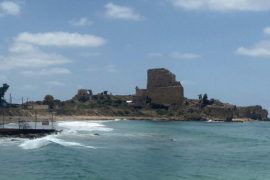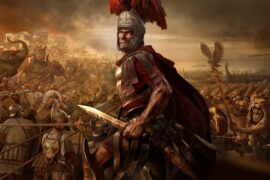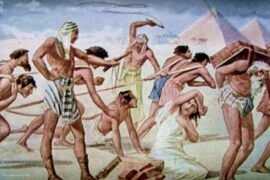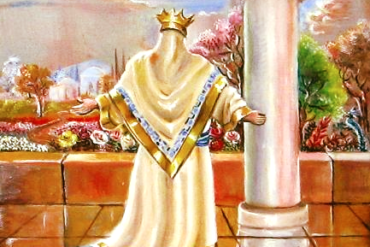This interview was conducted in Hebrew, and translated to English by the interviewer, then lightly edited for clarification.
[Danit Grady] Good evening K’vod HaRav.
[Rav Ouri Amos Cherki] Good evening.
[DG] So, I would like to talk to you a little bit about the situation of the Jewish people and the State of Israel today, as well as our national trajectory. How does the Rav define the national mission of the people of Israel in history? And where are we right now in the process of carrying out this mission?
[Rav Cherki] Things are already clear in the Book of B’reishit that we are meant to provide blessing to all the families of the earth. In other words, the Creator chose the people of Israel as the conduit of His revelation to humanity. And in this regard, we are in a very good position today.
I will explain why. The philosopher Jean-Jacques Rousseau explained that he does not think it is possible to understand the Jews so long as the Jews do not have their own state where they can express themselves without fear. Only then, when the Jews have the independence and self-confidence to express themselves without fear, could it be known what they have to say to humanity.
Well, after thousands of years, we finally have our own state. We can speak without fear. So it’s time to speak. In this sense, we are definitely in an advanced stage of our collective historic mission.
[DG] So the conditions now exist for the first time in thousands of years for Israel to share our message with the world. but we’re not yet sharing that message. Correct?
[Rav Cherki] Let’s say the establishment of the State of Israel, as it is grasped in the collective subconsciousness of humanity, is a “Biblical” event in the heart of the modern age. This has already aroused much amazement and interest from all over the world. But not every Israeli and not every Diaspora Jew is aware of our mission and what we’re meant to say to humanity. Nevertheless, it can definitely be said that the nations have a deep yearning for a meaningful message from the people of Israel.
[DG] Now the next question. The Zionist movement succeeded in establishing a state, ingathering the Jewish exiles from all over the world, and reviving the Hebrew language. Following these successes, in the Rav’s opinion, what are the current objectives through which we can advance the liberation of Jewish people?
[Rav Cherki] The absolute freedom of the people of Israel comes from believing in ourselves. Just as a person is self-sufficient so long as he believes in his independence and his free choice, so too the nation of Israel. We need to recognize our own legitimacy.
There is actually an ancient Hebrew trait – the children of Israel are called Baishanim (shy, reluctant people). This means that it’s actually a feature of our identity to have doubts about the legitimacy of our struggle, and to sometimes even support the claims of other nations against us. After all, the nations are convinced that the people of Israel have no right to decide on our own about our fate, and that the international community must determine what we should do and what we are allowed to do. These things are deeply rooted in the founding myths of the cultures that surround us, Christianity and Islam, and therefore there is no doubt that this also influences us. So long as we are confident in ourselves, confident in what we have to say, then from that moment on, we will no longer need to prove it because it will already have been proven.
[DG] Now I think that for most Israelis, since October 7, it has become more obvious what you are saying, that we lack confidence in ourselves and that we care too much what other nations say. And it seems that many Israelis, more than ever, are opposed to this and want to be more confident and independent. But our leaders might not be there yet.
[Rav Cherki] Look, I want to say thank you to our political leaders and also to the Israeli media. The leaders and the media do a great job. They maintain a thick shell that conceals the real process of Israel’s development underneath. There are deep processes taking place in Israeli society, very deep changes in consciousness, expressions of unity, self-sacrifice, and also very deep expressions of searching for identity. Now the media and politicians do everything they can to conceal what’s really taking place. And this is an excellent thing because deep processes, in order for them to properly develop, mustn’t be recognizable on the surface. So I have to say thank you to the media, which tells us a completely different story while a deep sociological processes takes place and penetrates the collective Israeli consciousness.
[DG] Okay. It’s good to hear this optimistic approach.
Now a slightly different topic. Now that the Kodesh (holy) and Uma (nationalist) forces have merged together into an ultra-religious ultra-nationalist vanguard sector of Israeli society, how will this sector also connect the power of Enoshut (universalism) in order to reach the level of the Kodesh Kodeshim (Holy of Holies)?
[Rav Cherki] First of all, there are a lot of fundamental assumptions behind your question. It’s obvious that you already have a fundamental grasp of some concepts I’m not sure that all of our readers will understand. You are referring to the words of HaRav Kook (Orot HaT’ḥiya 18), namely the connection between the three camps, the camp that deals only with religious things, those for whom the national identity is most important, and those for whom the universalist aspect is most important. So, as you rightly pointed out, a synthesis has already taken place, since the Six-Day War, and even more so after the Yom Kippur War, of the national and the religious forces within the people of Israel. And the national-religious sector, especially those in Judea and Samaria, exemplify this synthesis. And it’s actually surprising how much of an antithesis reaction we’ve seen to this from the more cosmopolitan sectors of Israeli society.
Now sometimes oversimplifying things and being a little caricaturish and stereotypical helps us better understand things. Let’s put it this way, the national and the religious camps are most concerned with the people of Israel.
What is important to the universal camp, to a large extent, is the nations of the world.
And then there’s the question, what does the Holy One think? What is important to Him?
And here, the significant point, which Rabbi Yehuda HaLevi says in the Kuzari, is that the relationship between Israel and the nations is like that of the heart and the organs. There’s a kind of organic unity. Organic unity is not uniformity. Not everything is the same. The heart is the heart, the organs are the organs. But what can the heart do without the organs? And what will the organs do without the heart? So we can understand that the Jewish national project has a universal purpose. And the moment this is revealed, there will be a reconciliation between the different forces within the people. Because everyone will understand that without the other, without the other’s influence, they have nowhere to go.
So the national-religious sector is in need of a universal message, and the universal sector is in need of Jewish identity. And it is the cooperation between these two extremes that can lead to a new identity paradigm. I expect that there will one day be very deep and real cooperation between those sitting in the Azrieli Towers in Tel Aviv and the Noar Gvaot (Hilltop Youth). And when this happens we will have something really special here.
[DG] And do you see such a thing happening in the near future? Because we saw in recent years that there is a very big gap between these camps. It feels like it’s…
[Rav Cherki] Let me tell you something. There are harsh statements. The harsh statements are, for example, what some people in the public said, “they are not my brothers, they are my enemies.” But who can say such a sentence? “I am not your brother!” Only a brother can say that.
That is, the harsh statement frames the brotherhood. The hidden brotherhood. And so, as a matter of fact, this meeting exists naturally. We are already in the process. I was part of a group of rabbis who met with the Brothers in Arms organizers during the fight in Israeli society over the government’s judicial reform legislation. Really the other end of our society.
And the responses that were received were very interesting. First of all, there was a response from nationalists who said that the rabbis who met with Brothers in Arms are being naive. That we do not understand who we are dealing with.
But at the same time, there was also a sharp criticism in Haaretz against Brothers in Arms for meeting with rabbis. They called them naive and said that they did not know who they were meeting.
It can be said that at the moment when two types of naive people meet, then there is room for progress. Of course, I do not think that more than one meeting was necessary. But one meeting actually created a sort of icebreaker. And this icebreaker allows for complex and difficult discussions to take place later in a more peaceful and more comfortable atmosphere, without fear of a civil war. So I think that we are really in the process, but we have a rule that there is no one who knows his way. “Ein baal hanes mekir b’niso” – a person who is in the midst of some process cannot see from above what is taking place.
But it is clear that the process is taking place.
[DG] Thank you. For the next question I’m going to change the subject again.
Does the Rav have a preferred solution for the conflict with the Palestinians? And how does the Rav see the future of relations between Jews and Palestinians in the land of Israel?
[Rav Cherki] It must be understood that the conflict is not between Israelis and Palestinians, but between the people of Israel and pan-Arabism. That is, the national Palestinian movement is but a branch of a larger conflict between the Islamic world and the Jewish people which are wrongly perceived to be a bridgehead of the Western world. This is not true because the people of Israel actually constitute our own unique civilization independent from the West. And the solution is actually a spiritual solution. Many times we hear influencers who claim that a conflict cannot become a religious conflict because then there will be no way to resolve it. But the truth is exactly the opposite.
I therefore recently published a small booklet that I wrote a long time ago outlining an authentic Torah position on Islam. On what we Jews need from Islam in order that it be acceptable to us. And after publishing this booklet, I received positive responses from the entire Arab world, so much so that I was also invited to Abu Dhabi by the heads of government and the heads of religion. And I really understand that there are many groups in the Arab world that hold pro-Israel positions and have traditionally been suppressed by extremists in their societies but are now daring to emerge.
And it is also necessary to emphasize the point that according to the Quran itself, the Creator gave this land to the people of Israel and therefore the transfer of the territories of the land of Israel to foreigners, even if they are Muslims, is a violation of the covenant also accepted by the Quran. Once this will be clear, the solutions to the Palestinian issue will naturally develop. That is, the entire discussion will be a spiritual one, not just to bring proof from the Quran that the land of Israel is ours. We are talking about providing substance to Islam that they are currently missing. They need to recognize that they need to learn from their source, from Israel, and then in the Beit Midrash we will also have what to teach them.
[DG] And what is the ideal relationship between the people of Israel and Islam? Is it possible to see Islam as the Noaḥide movement? And if so, could one say that the people of Israel have an interest in bringing the nations of the world to accept Islam to some extent?
[Rav Cherki] There is what is called in Jewish tradition the concept of the tshuva (return, repentance) of Yishmael. Our sages spoke about how Yishmael ben Avraham did tshuva, and the tshuva is that he recognized the role of Yitzḥak. If we can say since Islam arose, the children of Yishmael have returned in repentance to the God of Avraham. But they still need to return to the God of Yitzḥak.
We need to recognize who this land belongs to. And this has already been said in the Torah itself, that an angel said to the mother of Yishmael, “return to your master.” And if you return to your master, that is, if you recognize yourself as a daughter of Israel’s Torah, the Creator will greatly multiply your seed. That is, what weakens and freezes Islam today is that it denies its own source. The moment it does not deny its source, then it will be possible to “kasher” it. Whether to call it the Noaḥide movement is actually a very interesting question.
For the most part, the Noaḥides of the world are people who accept for themselves the authenticity of Israel’s Torah and reject the religions from which they came. But within Islam, there could actually be some process that can transform Islam into the Noaḥide religion. We are still far from it, but this is an idea certainly worth examining and learning about. Both for them and for us.
[DG] Okay. Again, another topic. How does the Rav see the relationship between Israel and the United States? Should we relate to the United States as the fourth empire – the kingdom of Edom – trying to obstruct the redemption process by keeping Israel small, weak and dependent on aid?
[Rav Cherki] Look, we need to be careful about sticking labels on entire cultures and so on. But in a certain way, the State of Israel represents an alternative cultural and moral path to the values of the West. This is the meaning of Israel’s dramatic return to the international stage as a Biblical event in the modern era. This represents a challenge to the 2,000 year hegemony of the Roman-Christian world, which appears to be in crisis. In this sense, it is possible to understand that there is some concern on the part of the United States and Europe that Israel will replace them. But on the other hand, we need to remember that Edom is a brother to the people of Israel.
“Ko amar aḥikha Yisrael…” (“So says your brother Israel…”)
That is, there is some hidden brotherhood. Rabbi Shimon bar Yoḥai already said that “Esav hates Yaakov” is a rule of nature but at the same time “…u’nshako b’khol libo“(“and he kissed him with all his heart”) so perhaps we can look forward to the tshuva of the Western world and their acceptance of Israel’s Torah.
Maybe I’ll explain it this way. The Western world, and the United States is included in this, inherited from Greek philosophy that the center of the world is man. And God, to some extent, is in the periphery. Islam, by contrast, holds a view that God is the center of everything and man is valueless next to Him. Our Torah teaches the bridge that can connect between these two cultures. Israel says that what is in the center is actually neither God nor man, but rather the dialogue between them. And I think that at once the Western world is able to internalize this, they will no longer feel threatened.
[DG] And how can we get there? Because so far we see the relationship between the United States and Israel as that of an empire and a vassal. It controls many of our decisions, as we have seen in recent months. Do we need to free ourselves from this relationship? To be more independent?
[Rav Cherki] There is no doubt about that. Every time we shackle ourselves to our “great friendship”,we do not help ourselves. We can even see that what is happening very prominently in the State of Israel, in the political sphere, is that there is a strong desire for many of our ruling elites not to be independent. They see it as preferable to be dependent on American decisions because the alternative is that Jews who are considered to be mischievous and crazy are the ones who will lead the conversation.
So we can say that sometimes there exists a desire to be under the control of someone else. Hishta’abdut (enslavement, subjugation) is a kind of temptation that exists deep in our cultural character. But the more we know how to stand up for ourselves, the healthier our relationships with other nations will be.
[DG] And we can say that this hishta’abdut is connected to our problem with self confidence, as we talked about earlier?
[Rav Cherki] Without a doubt, yes. The more we know who we are and believe in ourselves, the more we will know what we truly have to say to the world and the more they will listen to us.
[DG] If part of Israel’s historic mission is to bring humanity to the awareness that we’re all united at the Source, would it make sense to say that the capitalist system that reinforces our illusions of separateness, needs to be done away with?
[Rav Cherki] In the struggle of ideologies in history, there is always a strange struggle between collectivism and individualism. And this comes from an incorrect perception of both the individual and the collective. The real collective is the one that cares for the individual.
But the real individual cannot be separated from his place within the whole. Therefore, the Torah teaches us in one of the thirteen middot (character traits), that the whole needs the individual and the individual needs the whole. If the individual stands against the whole and the whole against the individual, that is a sign that we are neither talking about the whole nor about the individual.
[DG] One last question. When we look at the different tribal identities within Israeli society today, how does the Rav see the proper configuration so that each tribe can fully express its unique identity and value system while properly contributing to the collective nation and driving the redemption process forward?
[Rav Cherki] In my opinion, there is a childish temptation to divide Israeli society into cantons. The cantonization of Israeli society. Everyone will live his own life, Ḥaredim alone, liberals alone, and so on. But life is stronger than these divisions. We are on the same boat. So it seems that our actual interaction, the presence of one next to the other, is already happening. And many misconceptions about each other dissipate the moment we meet face to face. And that’s what will happen. Our sages taught that the Sh’khina (Divine Presence) rests on a person who is wise, heroic, and wealthy. And in the State of Israel, there is a wise sector, there is a heroic sector, and there is a wealthy sector. These three sectors are not yet connected together. And when that happens – and it is happening – we will be able to really talk about the inspiration of the Sh’khina and about peace within Israel.
[DG] Thank you.
[Rav Cherki] Thank you.





